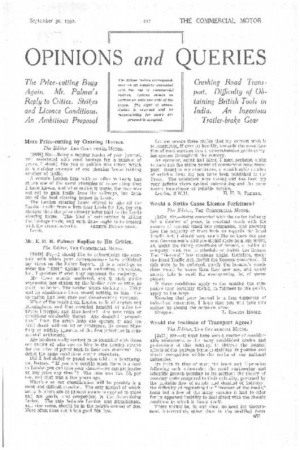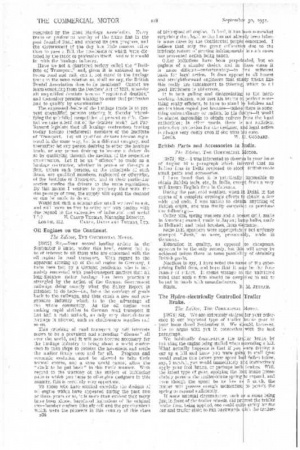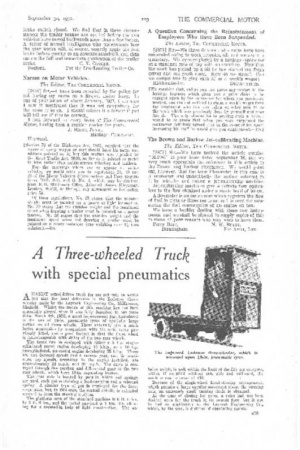OPINIONS and QUERIES
Page 55

Page 56

Page 57

If you've noticed an error in this article please click here to report it so we can fix it.
The Price-cutting Bogy Again. Mr. Palmer's Reply to Critics. Strikes and Licence Conditions, An Ambitious Proposal Crushing Road Trans. port. Difficulty of Obtaining British Tools in India. An Ingenious Trailer-brake Gear
More Price-cutting by Clearing Houses.
The Editor, TEE COMMERCIAL Moron.
[3868] Sir,—Being a regular reader of your journal. and associated with road haulage for a number of years, I should like you to publish this letter, which is a striking example of one clearing house robbing another of traffic.
A certain London firm with an office in Leeds has shown one of the worst examples of rate-cutting that I have known, and what makes-it worse, the rate was not cut to gain traffic from the railways, but from one of the best clearing houses in Leeds.
The London clearing house offered to take all the London traffic from a firm near Leeds for 15s. per ton cheaper than the price already being paid to the Leeds cleating house. This kind of rate-cutting is killing the haulage trade, and such firms ought to be treated with the utmost severity. ARTHUR BROWNRIDOE. Leeds.
Mr. E. H. B. Palmer Replies to His Critics.
The Editor, THE COMMERCIAL MOTOR.
[38697 Sir,—I should like to acknowledge the courtesy with which your Correspondents have criticized my Views on the Salter Report. It is a privilege to enter the " lists " against such undoubted authorities, but, I question if even they represent the majority.
My views remain unaltered, and if their public expression has shaken up the haulier ever so little, so much the better. The haulier wants shaking up. Unity. and its significance have meant nothing to him. Coo]:eration has been rare and throat-cutting rampant.
What of the roads from London to Southampton and Birmingham, and that crowded handful of miles between Liverpool and Manchester? Are sane rates or conditions obtainable -there? Any doubtful "proposition" from the scrap heap can operate to and fro (and does) without let or hindrance, its owner blissfully or wilfully ignorant of the first principles in commercial arithmetic.
Are hauliers really content to be identified with those one knows of who are on hire in the London streets for the price of petrol back to their own districts? No doubt the same conditions obtain elsewhere.
Did I feel elated or proud when told at a Southamp7 ton factory, "If you are outside when there is a load to London you can take your chance—we can get lorries at any price any time "? The rate was 12s. 6d. per ton, and that was a few years ago.
Whether or not classification will be possible is a moot and difficult question. The only method of which many hauliers are at present aware is applied to rates and not goods, and competition is the determining factor. The rate between London and Birmingham, and vice versa, should be in the neighbourhood of 30s. More often than not it is a good 10s. less.
Let me assure these critics that my earnest wish is to contribute, if ever so humbly, towards the co-ordination of road services into a comprehensive goods-carrying system throughout the country.
As operator, agent and hirer, I may, perhaps, claim to have run the entire gamut of commercial road transport. Based on my experiences, a considerable number of articles from my pen have been published in the Press. The consistent note throughout has been my very definite views against rate-cutting and the paramount importance of reliable service.
London, S.W.11. E. H. B. PALMER.
Would a Strike Cause Licence Forfeiture ?
The Editor, THE COMMERCIAL MOTOR.
[3870] Sir,—Being Connected with the motor industry for a number of years, in constant touch with the owners of several small bus companies, and knowing how the majority of them feels as regards the Road Traffic Act, I should very much like to know our present Government's attitude should there be a bus strike, as, under the ruling conditions of licence, a holder or company must run to schedule or forfeit the licence. The " General " bus company might, therefore, under the Road Traffic Act, forfeit the licences concerned. If this were to be enforced, surely the busmen's conditions would be worse than they now are, and would merely help to swell the ever-growing list of unemployed.
If these conditions apply to the smaller bus companies they certainly should, in fairness to the public, apply to the large.
Knowing that your journal is a firm supporter of individual enterprise, I hope that you will take this matter up should the occasion arise.
Kimpton. L. BOEHM( HOOLE.
Would the Institute of Transport Agree ?
The Editor, TTIE COMMERCIAL MOTOR.
[3871] Sir,—It must have been a matter of considerable amazement to the many established trades and professions of this country, to observe the belated efforts of the haulage trade to stabilize its position and obtain recognition within the ranks of our national industries.
Its birth in time of war ; the boom and depression following such upheavals; the rapid engineering and scientific growth peculiar to its section; the theory of economy costs compared to their actuality, governed by the unstable flow of supply and demand of industry ; the difficulty of regulating the "freedom of the roads," form but a few of the many excuses it had to offer for its apparent inability to deal direct with the chaotic condition in which it found itself.
There should be, in our view, no need for Government intervention, other than in the modified form E37 suggested by the Road Haulage Association. Every trade or profession worthy of the name has in the past founded itself and ordered its own progress, and the Government of the day has little concern other than to pass a Bill, the provisions of which were dictated by the trade or profession itself. And so it should be with the haulage industry.
Have we not a chartered society called the "Institute of Transport," and, given it is unbiased as between road and rail, can it not stand to the haulage trade in the same relation as, shall we say, the British Dental Association does to its members? Cannot we learn something from the Dentists' Act of 1921, whereby all unqualified dentists became "registered dentists," and thereafter persons wishing to enter that profession had to qualify by examination?
The expressed desire of the haulage trade is to prevent unqualified persons entering it, thereby intensi fying the unbridled competition at present so rife. Can not we take a leaf out of the dentists' book? Let Parliament legislate that all haulage contractors trading to-day become (registered) members of the Institute of Transport. Let all qualified drivers become registered in the same way, but in a different category, and thereafter let any person desiring to enter the haulage trade, or any person desiring to become a driver do so by qualifying through the medium of the respective examination. Let it be an "offence" to trade as a haulage contractor, whether in person or through a firm, unless such persons, or the principals of such firms, are qualified members, registered or otherwise, of the Institute of Transport, and in their particular section confine the drivers to the same regulations.
By this means I venture to prophesy that with the due passage of time, the supply will equal the demand or can be made to do so.
Would not such a scheme give us all we need to ask, and still leave us free to order our own destiny with due regard to the exigencies of industrial and social life? E. CLAUD THOMAS, Managing Director, London, E2. CAREY, DAVIS AND THOMAS, LTD.
Oil Engines on the Continent.
The Editor, THE COMMERCIAL MOTOR,
138721 Sir,—Your second leading article in the September 9 issue, under this head, cannot fail to be of interest to all those who are concerned with the oil engine in road transport. With regard to the apparent slowing up of the oil engine in Germany, I have been told by a German gentleman who is intimately connected with road-transport matters that all long-distance motor haulage has been practically strangled by the action of the German Government railways doing exactly what the Salter Report is intended to do here—i.e., force tile carriage of goods back to the railways, and thus crush a new and progressive industry which is to the advantage of the whole community. As the oil engine was making rapid strides in German road transport it has had a rude setback, as only very short-distance haulage is allowed, such as chain-stores supplies and
soon.
This crushing of road transport by rail interests seems to be a prevalent and spreading " disease " all over the world, and it will soon become necessary for the haulage industry to bring about a world conference to take steps to counter the movement and settle the matter firmly once and for all. Progress and economic evolution must be allowed to take their normal course, and a sane world cannot allow the "clock to be put back" in this futile manner. With regard to the warning on the subject of infringing patents which you issue to oil-engine designers in this country, this is certainly very opportune.
To those who have studied carefully the designs of oil engine which have appeared during the past two or three years or so, it is more than evident that many have been almost barefaced imitations of the original two-chamber engines (the air cell and the pre-chamber) which were the pioneers in this country of this class E38 of high-speed oil engine. Indeed, it has een somewhat surprising that legal action has not alre dy been taken in some cases by the Continental peopl concerned. I believe that only the great difficulti due to the intricate nature of proving infringement in such cases has prevented action being taken.
Other imitations have been perpet atecl, but on engines of a simpler design, and in hese cases it is more difficult—unfortunately—to nd sufficient basis for legal action. It does appear to all honest and straightforward engineers that sh cly tricks like this really are tantamount to thieving which to all good Britishers is abhorrent.
It is both galling and disappointing to the hardworking designer, who uses his brains t perfect some thing really efficient, to have to stand helpless and see his ideas copied just because—unless there is something extraordinary or radical in his d sign—it would be almost impossible to obtain redress rom the legal authorities ; in other words, there is not sufficient patent-law protection for the designer, a d legal action is always very costly even if one wins 8 case.
Leeds. W. . GODDARD.
British Parts and Accessories in ndia.
The Editor, THE COMMERCIAL °TOIL
• [3873] Sir,—I was interested to obser e in your issue of August 16 a paragraph which inf rred that an Indian firm in Delhi proposed to stoc British-made small parts and accessories.
I have found that it is practically impossible to obtain British tools, etc., in India, exce t from a very well-known English firm in Calcutta.
During the past cold weather, when 1 Delhi, in the course of a complete evening's efforts t obtain a few odds and ends, I was unable to obta n anything of British origin, and was finally compell d to purchase the following:—
Cotter pins, spring washers and a hr ast drill, made in America ; enamel, made in Japan; la p bulbs, made in Holland ; and paint brushes, from G rmany.
Some D.E. spanners were appropriate y but artlessly stamped "Junk," so were, presuma ly, made in Germany.
Education in quality, as opposed to cheapness. appears to be the only remedy, but thh. will never be achieved unless there be some possibili y of obtaining British goods. .
Needless to say, I have noted the na e of the enterprising Delhi firm, and hope that it my be the forerunner of others. It seems strange to the untutored mind that such a firm should be corn lied to ask to be put in touch with manufacturers.
I I.
R M. JERRAM.
The Hydro-electrically Controlled Brake.
The Editor, THE COMMERCIAL
[3874] Sir,—We are extremely oblige mice to our improved type of trailer your issue dated September 9. We s like to argue with you in connection paragraph. for your referbrake gear in mild, however, with the last
We habitually demonstrate the trm iler brake by Imitating the engine being stalled when scending a hill. What actually happens is that if you ere driving a car up a hill and knew you were goin to stall (you would realize this before your speed h d fallen below, say, 5 m.p.h.), you would immediately a d instinctively apply your foot brake, or perhaps botl brakes. With the latest type of gear, applying the fa t brake immediately permits the trailer-brake spring to expand, and even though the speed be as low a 5 m.p.h. the trailer will possess enough momentum to permit the spring to expand sufficiently. If some unusual circumstance, such s a stone being just in front of the trailer wheels, did pr vent the trailer brake from being applied, one could qui e safely let the car and trailer start to run backwards -ith the trailer
brake switch closed. We find that in these circumstances the trailer brakes are applied before the two vehicles have moved backwards more than a few inches. A driver of normal intelligence who understands how the gear works will, of course, smartly apply his foot brake before coming to an absolute standstill, and thus ensure the full and immediate application of the trailer brake. C. V. CLARKE, Bedford. For the Low-Loading Trailer Co.
Names on Motor Vehicles.
The Editor, TEE COMMERCIAL MOTOR.
[3875] have been reported by the police for
not having my name on a 30-cwt. motor lorry. In one of your issues of about January, 1931, I am sure I saw it mentioned that it was not compulsory for the name to be on. I should esteem it a favour if you will tell me if this be correct, I look forward to every issue of The Cornmerciat Motor, having been a regular reader for years. J. HIRST, JITNR.,
Haulage Contractor.
Heywood.
[Section 76 of the Highways Act, 183.5, required that the owner of every wagon or cart should have his name and address painted on it, but this section was repealed by the Road Traffic Act, 1930, so far as it related to motor vehicles (other than public-service vehicles) and trailers.
For • the markings which are to appear on motor vehicles, we would refer you to regulations 25, 30 and 38 of the Motor Vehicles (Construction and Use) Regulations, 1931, 13.1%. and 0. No. 4, which may be obtained from 1131. Stationery Office, Adastral House, Kingsway, London, W.C.2, or through any newsagent or bookseller, price 5d.
Of these regulations, No. 25 states that the unladen weight must be painted on a heavy or light locomotive. No. 30 states that the unladen weight and the maximum speed when drawing a trailer must be painted on a motor tractor. No. 38 states that the unladen weight and the maximum speed when not drawing a trailer must be painted on a heavy motorcar (one weighing over 21 tons unladen).—En.] ,
A Question Concerning the Reinstatement of Employees Who Have Been Suspended.
The Editor, THE COMMERCIAL MOTOR.
[3876] Sir,—We three drivers and a mate have been suspended owing to work dropping off, and we are in a quandary. We were employed by a haulage contractor at a standard rate of pay with no overtime. Now that the work has picked up a bit he has started one fresh driver and one fresh mate. How do we stand? Can we compel him to give each of us a week's wages?
Kidderminster. DISGRUNTLED.
[We consider that, unless you can prove any custom in the haulage business which gives you a prior claim to be engaged again by the contractor for whom you previously worked, you are not entitled to claim a week's wages from the contractor who has now taken on other men to do the work which was previously done by yourself and your friends. The only alternative to proving such a custom would be to prove that when you were suspended the contractor definitely agreed that in the event of his again increasing his staff he would give you employment.—En.] The Brown and Barlow Jet-calibrating Machine.
The Editor, THE COMMERCIAL MOTOR.
[3877] Si—We have noticed the article entitled " M.P.G." in your issue dated Seritember 16, and we very much appreciate the reference in this article to the Brown and Barlow Flowmeter. We would point out, however, that the term Flowmeter in this case is a misnomer and undoubtedly the author referred to it by mistake and meant a jet-calibrating machine.
Jet-calibrating machines give a definite flow equivalent to the flow obtained under a static head of 50 cm.
flowmeter is an instrument which registers the flow of fuel in pints or litres per hour, and is used for measuring the fuel consumption of an engine on test.
We issue a booklet dealing with these two instruments, and we shall be pleased to supply copies of this to those of your readers who may wish to have them.
Perry Barr, N. W. Bursar, Birmingham. For AMAL, LTD.






































































































